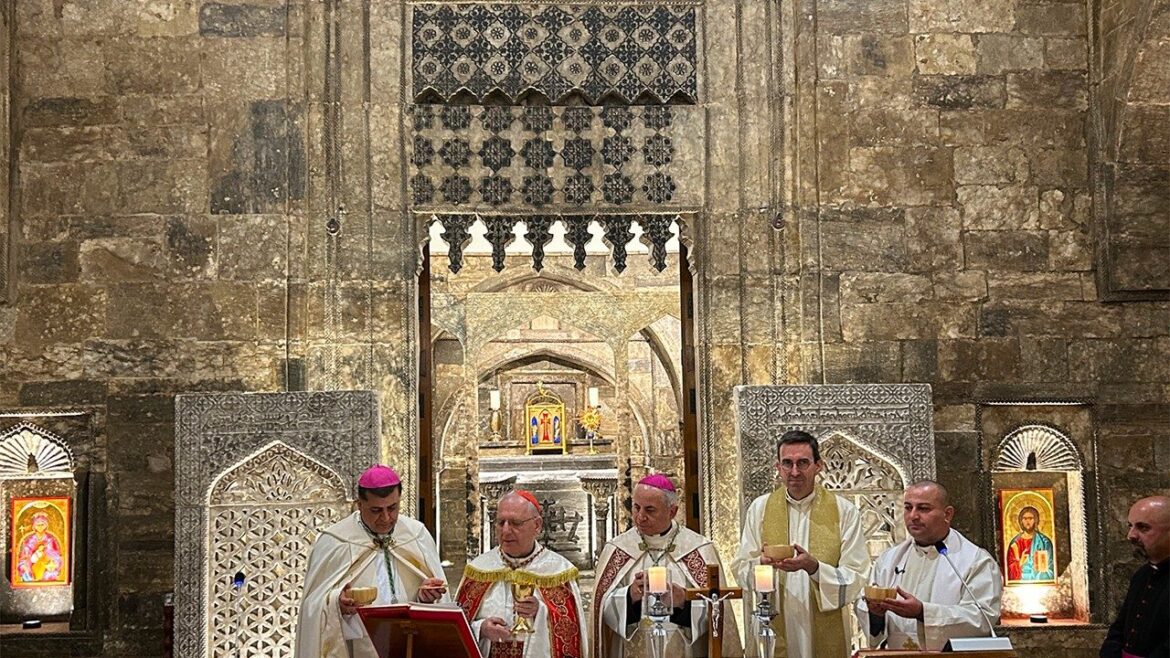The head of Iraq’s Chaldean Catholic Church speaks to Vatican News about the reconsecration of the historic Al-Tahira church in Mosul’s Old City.
By Joseph Tulloch – Mosul
“Despite everything that we’ve lived through, we still think that we have a vocation in this country, where Muslims are the majority, to bear witness to our faith.”
Those were the words of Patriarch Louis Raphaël I Sako, head of Iraq’s Chaldean church, speaking to Vatican News on Thursday just after celebrating Mass for the reconsecration of Mosul’s historic Al-Tahira church.
Gesturing to the church building, which was desecrated by ISIS in 2014, and subsequently heavily damaged in the year-long battle to liberate Mosul from the group, the Patriarch said that Iraqi Christians “have suffered a lot, and are tired.”
There are an estimated 200,000 Christians in the country, a sharp decline for a community that numbered in the millions just a few decades ago.
But, Patriarch Sako stressed, Iraq’s Christians “never lose faith and hope. Everything is based on hope.”
The ‘liturgy of the Spirit’ returns
Al-Tahira Chaldean Church was built in the mid-18th century with special permission from the Pasha of Mosul, who wanted to thank Christians for their active role in defending the city from Persian attack in 1743.
It was constructed on the site of the 5th-century Monastery of St Gabriel, which became a renowned theological school in 9th and 10th centuries.
It was in that monastery, Patriarch Sako told Vatican News, that the Chaldean liturgy – which had just been celebrated again for the first time in the newly restored church – was composed.
“It’s a liturgy of Spirit”, the Patriarch explained: “the invocation of the Spirit is what changes everything.” The prayers of the Chaldean liturgy, he said, are not “speculative or theological”, but “short and understandable”, drawn directly from the Bible.
The Patriarch then pointed to the Chaldean-style crosses decorating the church, noting that they were bare, without Jesus’ body portrayed on them like Western-style crucifixes.
“This gives us hope that Jesus is risen,” he said. “Even if we’re persecuted, even if we’re killed, we have this hope.”
Hopes and worries for the future
Al-Tahira had been inaugurated the day before, on Wednesday 15th October, in a secular ceremony that drew crowds of local journalists, as well the Mayor of Mosul and the Governor of Nineveh Province.
The Mass of reconsecration the following day was a quieter event, attended by a smaller group of Chaldean faithful. It was celebrated in a mixture of Arabic, Chaldean Neo-Aramaic, and French – the last language intended for the delegation from L’Oeuvre d’Orient, the French charity which had carried out the renovation of the church.
Eight years after its liberation from ISIS, very few Christians have returned to live in Mosul full-time, and the majority of attendees at the reconsecration had travelled to the city from surrounding Christian villages.
Noah, 29, had made the trip from Christian-majority Karamlesh.
“This reopening gives me hope that Christians might have a future in Iraq,” he said. “Things are better now than before, but we never know how the political situation will change. God willing, we will be able to stay.”



